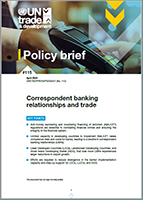
UNCTAD Policy Brief No. 115
Banks often use intermediary banks through Correspondent banking relationships (CBRs) to enable cross-border payments. These relationships are, therefore, critical for international trade transactions that rely on those payments. In recent years, CBRs have declined in many developing economies, and the de-risking strategy of some banks contributes to this trend. This decline in CBRs creates a challenge for LDCs, LLDCs, and SIDS to conduct trade.
This brief examines the cause of declining CBRs, and presents a preliminary assessment of how it can affect trade, and proposes possible pathways of action.
Key Points:
- Anti-money laundering and countering financing of terrorism (AML/CFT) regulations are essential to combating financial crimes and ensuring the integrity of the financial system.
- Limited capacity in developing countries to implement AML/CFT raises compliance risks and costs for banks, leading to a decline in correspondent banking relationships (CBRs).
- Least Developed Countries (LDCs), Landlocked Developing Countries, and Small Island Developing States (SIDS), that lose more CBRs experienced larger reductions in export growth.
- Efforts are required to reduce divergence in the banks’ implementation capacity and step-up support for LDCs, LLDCs, and SIDS.
Correspondent banking relationships and trade - UNCTAD Policy Brief No. 115 (UNCTAD/PRESS/PB/2024/1)
16 Apr 2024




